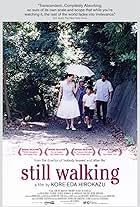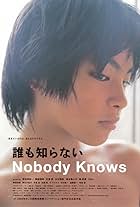IMDb RATING
7.8/10
1.5K
YOUR RATING
Osaka's top host club owner trains boys to excel in the underground love scene. They learn to fake relationships with girls, their income source.Osaka's top host club owner trains boys to excel in the underground love scene. They learn to fake relationships with girls, their income source.Osaka's top host club owner trains boys to excel in the underground love scene. They learn to fake relationships with girls, their income source.
- Director
- Awards
- 1 win & 3 nominations total
Featured reviews
This film, The Great Happiness Space by Jake Clynell, was an intriguing, thought-provoking and sometimes disturbing glimpse into a culture that is, to most, unfamiliar if not unthinkable. It engages the audience in a no-holds-barred look at the Japanese male companionship trade, providing insight into reasons for why men become hosts as well as why women seek out their services. Question after question was raised in my mind not only about the lives of the men working at Osaka's Cafe Rakkyo but also about a culture in which this industry can exist and thrive. What are these women lacking in life that makes them shell out thousands of dollars just for amusement, entertainment and male company? Many reviews and even the synopsis on the website, compare these male hosts to geisha, citing them as a contemporary male version of this ancient tradition, but I have to disagree. Geisha were well trained in a variety of art forms and provided dance and music in addition to their intelligent conversation to the men who paid to spend time in their presence. The male hosts at Rakkyo lack these talents and, instead, offer a different set of services and fill a very specific niche in a Japanese society that has an interesting relationship to sexuality and intimate relationships.
This is a movie to watch, not just to learn about the sex trade in Japan, but also to spark thoughts on why men and women both seek intimacy in its different forms within the service industry. Having lived in Japan and possessing an interest in gender and sexuality issues, I thought I knew what I was getting into when I pressed the play button, but this film introduced ideas and concepts that I shuddered at and could not stop thinking about for days.
This is a movie to watch, not just to learn about the sex trade in Japan, but also to spark thoughts on why men and women both seek intimacy in its different forms within the service industry. Having lived in Japan and possessing an interest in gender and sexuality issues, I thought I knew what I was getting into when I pressed the play button, but this film introduced ideas and concepts that I shuddered at and could not stop thinking about for days.
A wonderful look at the world of hosting in Osaka, where young pretty boys preen and hone the art of fulfilling - incompletely - the fantasies of their female clients at a tragic cost. In a refreshing change from the trend of centering every documentary on the documentary's maker, Jake Clennell stays off camera and is rarely heard. The staff and clientèle of host club Rakkyo Café are free to reveal their stories and insights without interference or dramatizations. Neither are needed as the stories are riveting. Unappreciated sacrifices and unfulfilled desires clash with deceit and opportunism in an atmosphere ruled by cold business ethics and marketed emotions. Clennell structures the narratives beautifully, winding through the artifice to the underlying truth as a night at the club unfolds. By the closing scenes of spent hosts staggering home in the early Osakan morning it's hard not to empathize with their emptiness or envy their bank accounts. One of the best documentaries I've seen, the main complaint is clocking in at just over seventy minutes it's too short. Worth hunting down.
This is a disturbing and important film that peels away many layers of meaning about the mutual manipulation that takes place between men and women. It examines love and need, but what it examines most of all is loneliness. It is a devastating critique of the phony love that is dispensed for money, and what it does both to those dispensing the money and those who profit from it.
The scene of almost all the action in this film is the Rakkyo Cafe, the most popular 'host bar' in Osaka, where women seek the favours of 'host boys' such as the exploitative yet empathetically decent Issei, owner of the bar. The women spend outrageous amounts of money to be pampered and pandered to (and systematically lied to) by these highly skilled and well-groomed young men who are similar to male versions of the famous geishas. The difficulty in maintaining this kind of artifice is evidenced by the high turnover: in many of these bars in Osaka (there are about 100), 'host boys' make a lot of money, but they can't tolerate the stress and demands for very long; few last longer than a year.
Despite being swarmed over by women who profess their adoration for them, the men do not get intimately involved with them. If they get too close, if they have sex with them, the men will lose their illusion of perfection, and will no longer be 'marketable'. These young women pursue a 'happiness place' a la Peter Pan's Neverland. They search for a kind of love that exists only in illusion and fantasy.
Essai is an articulate and thoughtful man who understands all too well the control he has over the women. He also understands the emotional price he is paying for engaging in this activity. He 'loves' them, offers them solace, but he has become profoundly disaffected. 'I can't trust any woman any more,' he says.
This superb film (director Jake Clennell offers no narration and lets his camera do all the work) shows that Issei and all of these well-paid gigolos (without the sex), as joyous as they appear on the screen, desperately want to be loved. They end their long nights at dawn, and go home alone. These shining boys and their adoring 'girlfriends' are, in the end, desperately lonely people.
This film, in a larger sense, is a metaphor for modern society as a whole. In the midst of plenty, loneliness and alienation abound.
The scene of almost all the action in this film is the Rakkyo Cafe, the most popular 'host bar' in Osaka, where women seek the favours of 'host boys' such as the exploitative yet empathetically decent Issei, owner of the bar. The women spend outrageous amounts of money to be pampered and pandered to (and systematically lied to) by these highly skilled and well-groomed young men who are similar to male versions of the famous geishas. The difficulty in maintaining this kind of artifice is evidenced by the high turnover: in many of these bars in Osaka (there are about 100), 'host boys' make a lot of money, but they can't tolerate the stress and demands for very long; few last longer than a year.
Despite being swarmed over by women who profess their adoration for them, the men do not get intimately involved with them. If they get too close, if they have sex with them, the men will lose their illusion of perfection, and will no longer be 'marketable'. These young women pursue a 'happiness place' a la Peter Pan's Neverland. They search for a kind of love that exists only in illusion and fantasy.
Essai is an articulate and thoughtful man who understands all too well the control he has over the women. He also understands the emotional price he is paying for engaging in this activity. He 'loves' them, offers them solace, but he has become profoundly disaffected. 'I can't trust any woman any more,' he says.
This superb film (director Jake Clennell offers no narration and lets his camera do all the work) shows that Issei and all of these well-paid gigolos (without the sex), as joyous as they appear on the screen, desperately want to be loved. They end their long nights at dawn, and go home alone. These shining boys and their adoring 'girlfriends' are, in the end, desperately lonely people.
This film, in a larger sense, is a metaphor for modern society as a whole. In the midst of plenty, loneliness and alienation abound.
The best doc on underground Japanese culture I have seen. It was Refreshing to see an independent doc that held up technically for a Change, excellent camera operation and top notch editing and music. My Friends and myself spent the rest of the night discussing the strange And deep issues brought up by the characters in this film. The film is based around a gang of male hustlers -geisha boys in Osaka was at first a little unsure it seemed that the film had a heavy sense of art direction and a cinematic air that seemed a little incongruous with the harsh realities of the key characters lives, however as the film develops and new twists are revealed it becomes apparent that this is great documentary story telling in a classical tradition.I have never seen such frankness from this element of Japanese society. it was also nice to watch a foreign language doc made for an English speaking audience that did not rely on narration title cards or voice over. An entertaining film with a hidden depth! I would recommend you see this One if you get a chance.
This is a fine documentary as it first draws you in, building up the myth and reputation of Issei, the enigmatic and charismatic club owner (as others have said). The host boys are indeed hip and stylish, and the initial part of the film shows the 'neverland' where girls can buy an evening with the ideal guy... sad, but still, a standard business transaction, right?
However, after that you learn more about the girls and what they do in order to raise the money to feed their habit or addiction or passion (whichever you may see it as) for their favourite hosts. Then what looked like an interesting social phenomenon starts to seem like a twisted interrelationship between industries.
The film is good because it doesn't take sides; it shows different perspectives on the same issues and leaves you to draw your own conclusions. It shows different aspects of life at the host club, different parts of the process - from picking up girls to closing time. It raises questions - sure, these guys can earn millions of yen a month, but really, what is the profit at the end of the day?
Different people watching it will draw different conclusions, I'm sure. A good one for discussion on gender issues (I for one don't really see it as women getting their own back - to me, the men are still in control here, and women are doubly victimized, but you could take it differently too), social matters, etc. A good watch and a well-made film.
However, after that you learn more about the girls and what they do in order to raise the money to feed their habit or addiction or passion (whichever you may see it as) for their favourite hosts. Then what looked like an interesting social phenomenon starts to seem like a twisted interrelationship between industries.
The film is good because it doesn't take sides; it shows different perspectives on the same issues and leaves you to draw your own conclusions. It shows different aspects of life at the host club, different parts of the process - from picking up girls to closing time. It raises questions - sure, these guys can earn millions of yen a month, but really, what is the profit at the end of the day?
Different people watching it will draw different conclusions, I'm sure. A good one for discussion on gender issues (I for one don't really see it as women getting their own back - to me, the men are still in control here, and women are doubly victimized, but you could take it differently too), social matters, etc. A good watch and a well-made film.
Did you know
- Quotes
Female Customer: When I get drunk and you don't entertain me I can't stand it.
Details
- Release date
- Country of origin
- Official site
- Languages
- Also known as
- Место безграничного счастья: История осакского похитителя сердец
- Filming locations
- Production company
- See more company credits at IMDbPro
Box office
- Budget
- $70,000 (estimated)
- Runtime1 hour 16 minutes
- Color
Contribute to this page
Suggest an edit or add missing content

Top Gap
By what name was The Great Happiness Space: Tale of an Osaka Love Thief (2006) officially released in India in English?
Answer














